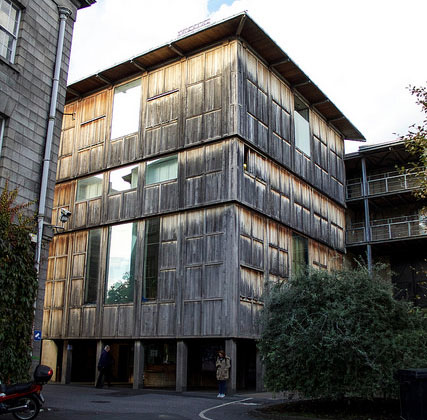
Every year, Trinity’s Department of Drama showcases the work of its graduating students at the Debut Festivals. The festival is split into two periods, one in November or December and one in February or March. Getting a “debut” means being offered to direct an hour-long production in the Samuel Beckett Theatre for a three-night run. Competition for a debut is often intense, as it affords students the opportunity to make full use of a professional working theatre without paying rent and industry professionals are often invited to view their work. I spoke with Kerill Kelly, a final-year drama and theatre studies student to discuss his role as co-director of Halleloo, his devising debut. But first, a brief explanation of how debuts work.
The two parts of the festival are differentiated by the material with which the directors work. The first part of the festival is referred to as the “directing debuts” and are a somewhat more traditional affair. The brief given to directors is to direct a previously published text of no longer than an hour. This is a harder task than it might initially seem – most classical texts are multiple acts in length. On top of this, the absence of funds necessary for period productions are the reason that directing debuts tend to skew towards the contemporary. The selection of texts across the five to seven productions presented each year generally consist of one or two contemporary British texts, a couple of late 20th century avant-garde pieces (think Beckett, Pinter and Stoppard), an Irish play from the 1990s and one weird European play (we’re looking at you, Eugene Ionesco and Jean-Paul Sartre).
The second part of the festival is referred to as the devising debuts. These are distinguished from the directing debuts by being entirely original works, the material having been devised over the six week rehearsal process. They are usually co-created by the actors, director and other members of the production team. Previously, it was only the director who would be marked on the production, bearing the entire responsibility for the new work, but recently performers and designers have also been marked for their contributions. This might seem like a harder option, given that a play has to be created and rehearsed in the same time frame allotted to the directing debuts. However, it is often easier to work with the material of a student standard rather than attempt to navigate the nuances of the late work of someone like Jean Genet.
Kelly, who has previously acted in several directing and devising debuts stated: “I would attribute the vast majority of my learning experiences in college to performing in other people’s debuts.” This makes sense as it is the largest practice-based endeavour undertaken during the degree. Many people would certainly acknowledge the role their debuts played in providing them with a grounding in acting, directing, designing or production management. Kelly said that a debut “is the perfect way to finish this course”. He cited several features of the debut process, such as the restrictions of time, space and money and its function as realistic preparation for the “real world” of contemporary Irish theatre. Although these restrictions can often make for tough rehearsals, Kelly said he loved “how open” the process was and that “it really is you presenting your ideal theatre”, a freedom which is not often afforded in the real world. He finished by saying that the “broadness [of possibilities] was ideal given that there’s forty people in the course” and that “the variation that comes out in the shows is great”.
Although having a debut is a wonderful learning opportunity for a student, there are several stresses inherent in the territory. Firstly, the department only provides the director with a €300 budget, not nearly sufficient to mount a decent production – even when none of the people involved are getting paid. Lighting alone typically costs between €50 and €100. The maximum budget allowed for a production is €800, the deficit which must be accounted for by the student’s own fundraising – meaning that they must essentially fundraise their own degree. Secondly, the debut is an extremely time-consuming venture, requiring upwards of six weeks of intensive rehearsals plus the week of performances themselves, a time commitment which usually exceeds the allocated 100 hours for a ten-credit module. However, several shows in recent years have gone on to take a spot in the Dublin Fringe Festival, such as LOVE+, Efficacy 84 and Half-Light, to name but a few. It is widely regarded as a place to spot up-and-coming talent.






